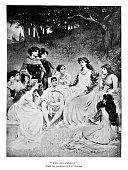-
Title: A Game of Wits: The Ingenious Deception in the Tale of Filippa
Introduction
One of the tales from Giovanni Boccaccio's "The Decameron" is the story of Filippa, which explores themes of love, deception, and the cunning nature of human beings. Set against the medieval social structure backdrop, this tale reveals the complexities of relationships and the lengths to which individuals will go to uphold their honor and evade the consequences of their actions. My main argument focuses on how Filippa's cleverness not only highlights her intelligence and agency but also invites readers to question societal norms surrounding love and fidelity.
Summary
In the tale of Filippa, a beautiful woman is married to a wealthy man who is often away on business. Filippa finds herself in a situation where she falls in love with a handsome young man who works under her husband. When her husband returns home unexpectedly, Filippa must think quickly to protect her reputation and her budding romance. Using her wit, she devises an elaborate ruse that ultimately allows her to maintain her honor while continuing her affair, showcasing her cleverness and resourcefulness in a society that imposes strict moral codes on women.
Analysis
Boccaccio excels in employing literary elements that enhance the storytelling experience, particularly through his vivid character descriptions and engaging dialogue. The playful exchange between characters and the clever machinations employed by Filippa create a lively atmosphere that captivates the reader. The light-hearted tone with the serious implications of betrayal and fidelity amplifies the moral complexities that the characters navigate and reflects the broader societal tensions of the era.
Character motivation is central to understanding Filippa's choices. Her actions stem from a deep desire for love and the fulfillment of her own needs in a world that often restrains women. The portrayal of Filippa challenges the traditional role of women in her society, rather than being a passive recipient of fate, she takes control of her circumstances. This assertion of agency ultimately serves as both a personal victory and a critique of the restrictive structures that govern women's lives, making her a compelling protagonist in the world.
The themes present in Filippa's tale resonate beyond the historical context, addressing universal concepts of love, desire, and morality. Filippa's clever established norms speak to the human condition and the complexity of our desires. The story remains relevant as it prompts discussions about fidelity, personal agency, and the nature of love in a society that often seeks to impose rigid definitions on relationships. Boccaccio’s exploration of these themes encourages readers to reflect on their own societal constraints and the ways in which individuals navigate love's labyrinth.
Personal Response
After reading Filippa's tale, I was struck by her resourcefulness and the way she exemplifies intellect over brute force in a male-dominated society. It was refreshing to see a female character who actively shapes her destiny rather than being a victim of circumstances. The story has made me reflect on how societal expectations still influence our lives today, making it essential to consider how intelligence and cleverness can serve as tools for empowerment. Filippa's actions, while rooted in necessity, also has admiration for her audacity, which resonates deeply with anyone who has ever felt constrained by societal norms.
Conclusion
In conclusion, Boccaccio's tale of Filippa has themes of love, deception, and agency that remain in today's world. The story’s exploration of the lengths one will go to preserve personal desires against societal expectations prompts necessary reflection on issues of gender and relationships. Filippa’s character continues to inspire discussions about empowerment in the world, where these themes are still relevant, reminding us of literature's ability to mirror and challenge societal norms.
#thedecameronTitle: A Game of Wits: The Ingenious Deception in the Tale of Filippa Introduction One of the tales from Giovanni Boccaccio's "The Decameron" is the story of Filippa, which explores themes of love, deception, and the cunning nature of human beings. Set against the medieval social structure backdrop, this tale reveals the complexities of relationships and the lengths to which individuals will go to uphold their honor and evade the consequences of their actions. My main argument focuses on how Filippa's cleverness not only highlights her intelligence and agency but also invites readers to question societal norms surrounding love and fidelity. Summary In the tale of Filippa, a beautiful woman is married to a wealthy man who is often away on business. Filippa finds herself in a situation where she falls in love with a handsome young man who works under her husband. When her husband returns home unexpectedly, Filippa must think quickly to protect her reputation and her budding romance. Using her wit, she devises an elaborate ruse that ultimately allows her to maintain her honor while continuing her affair, showcasing her cleverness and resourcefulness in a society that imposes strict moral codes on women. Analysis Boccaccio excels in employing literary elements that enhance the storytelling experience, particularly through his vivid character descriptions and engaging dialogue. The playful exchange between characters and the clever machinations employed by Filippa create a lively atmosphere that captivates the reader. The light-hearted tone with the serious implications of betrayal and fidelity amplifies the moral complexities that the characters navigate and reflects the broader societal tensions of the era. Character motivation is central to understanding Filippa's choices. Her actions stem from a deep desire for love and the fulfillment of her own needs in a world that often restrains women. The portrayal of Filippa challenges the traditional role of women in her society, rather than being a passive recipient of fate, she takes control of her circumstances. This assertion of agency ultimately serves as both a personal victory and a critique of the restrictive structures that govern women's lives, making her a compelling protagonist in the world. The themes present in Filippa's tale resonate beyond the historical context, addressing universal concepts of love, desire, and morality. Filippa's clever established norms speak to the human condition and the complexity of our desires. The story remains relevant as it prompts discussions about fidelity, personal agency, and the nature of love in a society that often seeks to impose rigid definitions on relationships. Boccaccio’s exploration of these themes encourages readers to reflect on their own societal constraints and the ways in which individuals navigate love's labyrinth. Personal Response After reading Filippa's tale, I was struck by her resourcefulness and the way she exemplifies intellect over brute force in a male-dominated society. It was refreshing to see a female character who actively shapes her destiny rather than being a victim of circumstances. The story has made me reflect on how societal expectations still influence our lives today, making it essential to consider how intelligence and cleverness can serve as tools for empowerment. Filippa's actions, while rooted in necessity, also has admiration for her audacity, which resonates deeply with anyone who has ever felt constrained by societal norms. Conclusion In conclusion, Boccaccio's tale of Filippa has themes of love, deception, and agency that remain in today's world. The story’s exploration of the lengths one will go to preserve personal desires against societal expectations prompts necessary reflection on issues of gender and relationships. Filippa’s character continues to inspire discussions about empowerment in the world, where these themes are still relevant, reminding us of literature's ability to mirror and challenge societal norms. #thedecameron· 0 Yorumlar ·0 hisse senetleri ·128 Views ·0 önizleme1
-
God gave you a gift of 86,400 seconds today. Have you used one to say 'thank you?'
-William Arthur WardGod gave you a gift of 86,400 seconds today. Have you used one to say 'thank you?' -William Arthur Ward· 0 Yorumlar ·0 hisse senetleri ·50 Views ·0 önizleme2
Daha Hikayeler




